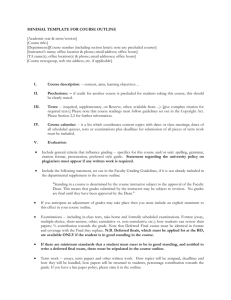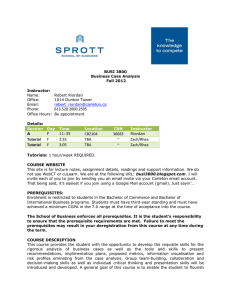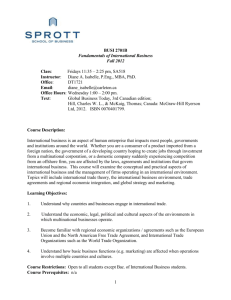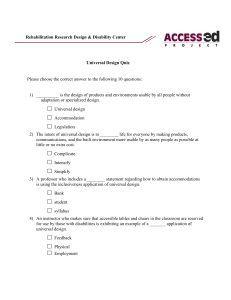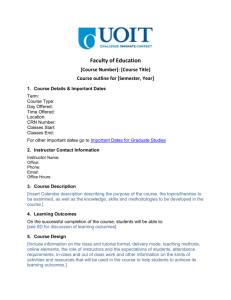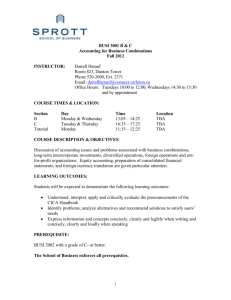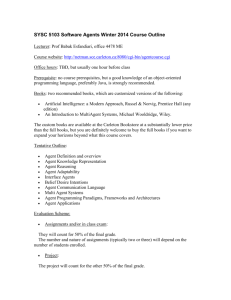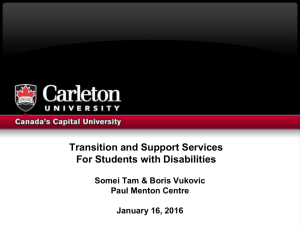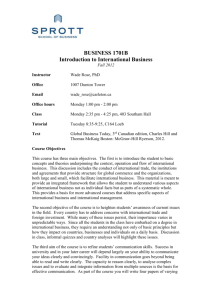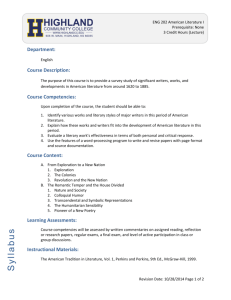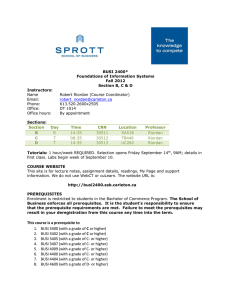2012-3301 syllabus
advertisement
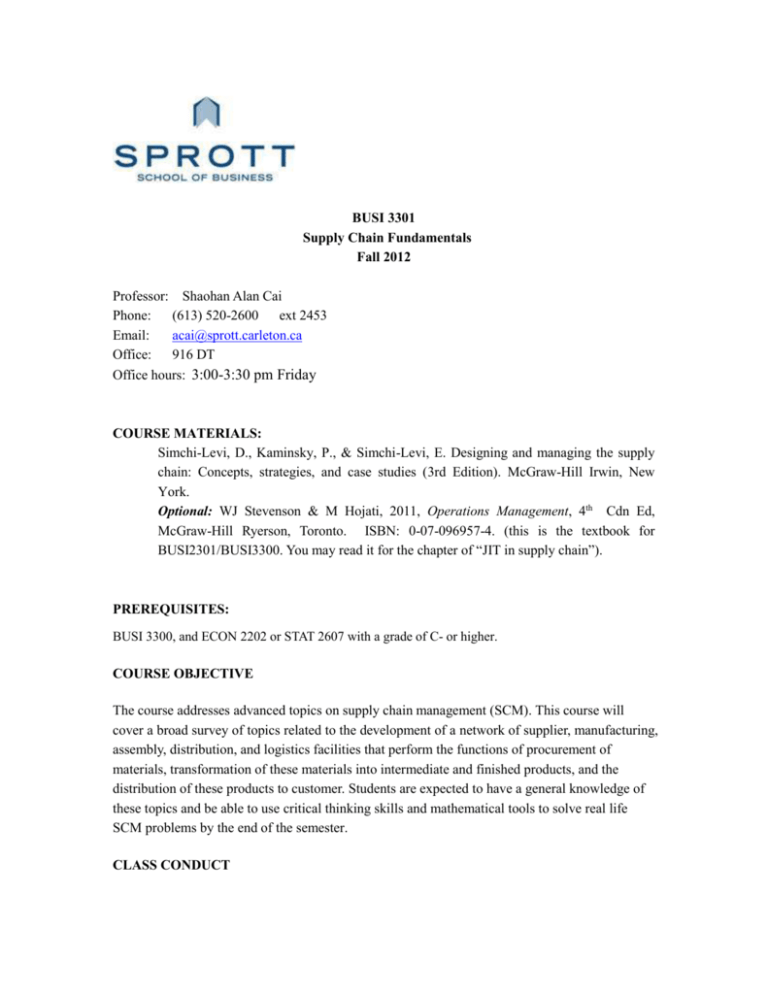
BUSI 3301 Supply Chain Fundamentals Fall 2012 Professor: Shaohan Alan Cai Phone: (613) 520-2600 ext 2453 Email: acai@sprott.carleton.ca Office: 916 DT Office hours: 3:00-3:30 pm Friday COURSE MATERIALS: Simchi-Levi, D., Kaminsky, P., & Simchi-Levi, E. Designing and managing the supply chain: Concepts, strategies, and case studies (3rd Edition). McGraw-Hill Irwin, New York. Optional: WJ Stevenson & M Hojati, 2011, Operations Management, 4th Cdn Ed, McGraw-Hill Ryerson, Toronto. ISBN: 0-07-096957-4. (this is the textbook for BUSI2301/BUSI3300. You may read it for the chapter of “JIT in supply chain”). PREREQUISITES: BUSI 3300, and ECON 2202 or STAT 2607 with a grade of C- or higher. COURSE OBJECTIVE The course addresses advanced topics on supply chain management (SCM). This course will cover a broad survey of topics related to the development of a network of supplier, manufacturing, assembly, distribution, and logistics facilities that perform the functions of procurement of materials, transformation of these materials into intermediate and finished products, and the distribution of these products to customer. Students are expected to have a general knowledge of these topics and be able to use critical thinking skills and mathematical tools to solve real life SCM problems by the end of the semester. CLASS CONDUCT The class time will be taken up by lecturing from the course instructor as well as case studies, exercises, and games. Much of the time will be devoted to the discussion of concepts, cases, and problems. You are expected not only to attend class, but also to be prepared to discuss the problems and exercises on the day assigned. Active participation in class discussions is an important part of this course, and I will therefore feel free to call on anyone in the classroom at any time for analysis, comments, or problem solutions. Be sure to bring a calculator, and your textbook to class with you at all times. ATTENDANCE AND PARTICIPATION Attendance and Participation is integral part of this course. Participation in the class will be recorded. Failure to attend class on a regular basis may reduce your overall grade by as much as five percent. Any absence from class should be discussed with your instructor before the class. MARKS ALLOCATIONS: credit for the course will be based on the evaluation items outlined below. Evaluation Item Mark In-class test 20 Case discussion 40 Group report on Global Sourcing & Logistics Exercise 5* Group report on Wood supply game 5 Take home essay exam 25 Attendance for the classes without case discussion/exercise 5 Total 100 * 3 points of bonus will be given to the team that perform best in the exercise IN-CLASS TEST There will be two in-class tests that cover material related to inventory management, supply contracts and pricing. TAKE HOME ESSAY EXAM There will be a take home essay exam that covers theories addressed in the class. CASE DISCUSSION There will be four case discussions. The discussion questions could be found on CULEARN. To prepare for the case presentations, you need to become the "expert" on the assigned case study. You need to read the cases thoroughly, and prepare for the discussion questions before you come to class. Attendance is required. Your performance on case study is evaluated based on your contribution to class discussion. The case discussion will be video recorded for the purpose of evaluation. Participation quality (thoughtfulness of comments or questions) is valued more than participation quantity (frequency of comments or questions). GLOBAL SOURCING & LOGISTICS EXERCISE Global Sourcing & Logistics Exercise is a pencil-and-paper simulation. The students will be divided into groups to play the role of the management team of a company that manufactures widgets. Students consider the various sourcing and offshoring decisions that arise when a lower-cost country is put into play as a potential source for raw materials and/or plant locations. Each group also needs to write a short report to answer the assigned discussion questions. THE WOOD SUPPLY GAME The wood supply game is a role-playing game where the participants have to minimize costs by managing inventory levels in a production-distribution chain in forest product industry. The game consists of 7 sectors: forest, sawmill, paper mill, 2 wholesalers, and 2 retailers. Accordingly, the class will be divided into 7 groups. Each group needs to bring a laptop to the class, in order to play the computer-simulated game. You try to minimize the costs by managing inventory levels in this production-distribution chain. For each week in the game, you need to decide how much to order (or how much to produce) to fulfill the demand and to minimize inventory carrying cost. Each group also needs to write a short report to answer the assigned discussion questions. MAKE-UP TEST/EXERCISE/CASE DISCUSSION Make-up test (without penalty to the grade) will be allowed only if you cannot attend a class and provide the instructor with a university-sanctioned excuse for your absence. For class exercise and case discussion, the student needs to provide the instructor with a university-sanctioned excuse for your absence before the class. The weights of the exercise marks will be transferred to other evaluation items. Failure to notify the instructor before the class will result in the loss of the participation mark. COURSE SCHEDULE: The following is a general outline of material to be covered during the semester. Note: the schedule is subject to changes in response to progress and opportunities that may arise in a given semester. Therefore it is imperative for you to attend class and be aware of new developments in the course that may affect the due dates of assignments or scheduling of tests. 2012/9/6 2012/9/13 2012/9/20 2012/9/27 2012/10/4 2012/10/11 2012/10/18 2012/10/25 2012/11/1 2012/11/8 2012/11/15 2012/11/22 2012/11/29 Subject Introduction to supply chain Inventory management and risk pooling Supply contract Case discussion: Reebok NFL Replica Jerseys: A Case for Postponement (p. 172). Network planning Distribution In class test Strategic alliance Case discussion: How Kimberly-Clark Keeps Costco in Diapers (p.243) JIT in supply chain Supply chain integration Global logistics and risk management Exercise: Global Sourcing & Logistics Exercise Customer Value Case: Walmart changes tactics to meet international tastes (p.309) Coordinated product and supply chain design Case: Hewlett-Packard company: network printer design for universality Bull whip effects/ Exercise: wood supply game Procurement and outsourcing strategy Information technology Reading Chapter 1 Chapter 2 Chapter 4 Chapter 3 Chapter 7 Chapter8 Chapter 6 Chapter 10 Chapter 12 Chapter 11 Chapter 5 Chapter 9 Chapter 14 Required calculator in BUSI course examinations If you are purchasing a calculator, we recommend any one of the following options: Texas Instruments BA II Plus (including Pro Model), Hewlett Packard HP 12C (including Platinum model), Staples Financial Calculator, Sharp EL-738C & Hewlett Packard HP 10bII Group work The Sprott School of Business encourages group assignments in the school for several reasons. They provide you with opportunities to develop and enhance interpersonal, communication, leadership, follower-ship and other group skills. Group assignments are also good for learning integrative skills for putting together a complex task. Your professor may assign one or more group tasks/assignments/projects in this course. Before embarking on a specific problem as a group, it is your responsibility to ensure that the problem is meant to be a group assignment and not an individual one. Medical certificate Please note that in all occasions that call for a medical certificate you must use or furnish the information demanded in the standard university form. http://www2.carleton.ca/registrar/forms/ Persons with disabilities Students with disabilities requiring academic accommodations in this course must register with the Paul Menton Centre for Students with Disabilities (PMC) for a formal evaluation of disability-related needs. Documented disabilities could include but are not limited to mobility/physical impairments, specific Learning Disabilities (LD), psychiatric/psychological disabilities, sensory disabilities, Attention Deficit Hyperactivity Disorder (ADHD), and chronic medical conditions. Registered PMC students are required to contact the PMC, 613-520-6608, every term to ensure that I receive your Letter of Accommodation, no later than two weeks before the first assignment is due or the first in-class test/midterm requiring accommodations. If you only require accommodations for your formally scheduled exam(s) in this course, please submit your request for accommodations to PMC by the deadlines published on the PMC website. Religious observance Students requesting academic accommodation on the basis of religious observance should make a formal, written request to their instructors for alternate dates and/or means of satisfying academic requirements. Such requests should be made during the first two weeks of class, or as soon as possible after the need for accommodation is known to exist, but no later than two weeks before the compulsory academic event. Accommodation is to be worked out directly and on an individual basis between the student and the instructor(s) involved. Instructors will make accommodations in a way that avoids academic disadvantage to the student. Students or instructors who have questions or want to confirm accommodation eligibility of a religious event or practice may refer to the Equity Services website for a list of holy days and Carleton's Academic Accommodation policies, or may contact an Equity Services Advisor in the Equity Services Department for assistance. Pregnancy Pregnant students requiring academic accommodations are encouraged to contact an Equity Advisor in Equity Services to complete a letter of accommodation. The student must then make an appointment to discuss her needs with the instructor at least two weeks prior to the first academic event in which it is anticipated the accommodation will be required. Plagiarism The University Senate defines plagiarism in the regulations on instructional offenses as: "to use and pass off as one's own idea or product work of another without expressly giving credit to another." Borrowing someone else's answers, unauthorized possession of tests or answers to tests, or possession of material designed in answering exam questions, are also subject to university policy regarding instructional offences. For more information on Carleton University's Academic Integrity Policy, consult: http://www1.carleton.ca/studentaffairs/academic-integrity/ Important Dates & Deadlines - Fall Term 2012 September 1, 2012 Last day for receipt of applications from potential fall (November) graduates. September 3, 2012 Statutory holiday, University closed. September 4, 2012 Fall term begins. September 4-5, 2012 Academic Orientation. All students are expected to be on campus. Class and laboratory preparations departmental introductions for students and other academic preparation activities will be held. September 5, 2012 Orientation for Teaching Assistants. September 6, 2012 Fall and fall/winter classes begin. September 19, 2012 Last day for registration. Last day to change courses or sections for fall/winter and fall term courses. September 30, 2012 Last day to withdraw from fall term and fall/winter courses with a full fee adjustment. Last day for receipt of applications for review of final grades in summer term courses. September 28-29, 2012 Summer deferred final examinations to be written. October 5, 2012 University Day at Carleton. Undergraduate classes suspended. December examination schedule (fall term final and fall/winter mid-terms) available online. October 8, 2012 Statutory holiday, University closed. October 15, 2012 Last day for receipt of applications for admission to a degree program for the 2013 winter term from applicants whose documents originate from outside Canada or the United States. November 9, 2012 Last day to submit, to the Paul Menton Centre for Students with Disabilities, Formal Examination Accommodation Forms for December examinations. November 15, 2012 Last day for receipt of applications for admission to a degree program for the winter term. November 19, 2012 Last day for tests or examinations in courses below the 4000-level before the final examination period (see Examination Regulations in the Academic Regulations of the University section of this Calendar). December 1, 2012 Last day for receipt of applications from potential winter (February) graduates. December 3 (Monday), 2012 Fall term ends. Last day of fall-term classes. Last day for academic withdrawal from fall term courses Last day for handing in term work and the last day that can be specified by a course instructor as a due date for term work for fall term courses. Last day for receipt of applications for degree program transfers for winter term. Last day for receipt of applications for admission to a degree program for the 2013 winter term. December 4-5, 2012 No classes take place. December 5, 2012 Last day for receipt of applications for degree program transfers for winter term. December 6-19, 2012 Final examinations in fall term courses and mid-term examinations in fall/winter courses may be held. Examinations are normally held in the day and evening during the Monday to Saturday period .In exceptional circumstances, it may be necessary to schedule an examination on a Sunday. December 16, 2012 Fall Co-op Work Term Reports due. December 20, 2012 All take home examinations are due. December 24, 2012 to January 1, 2013 University closed.
